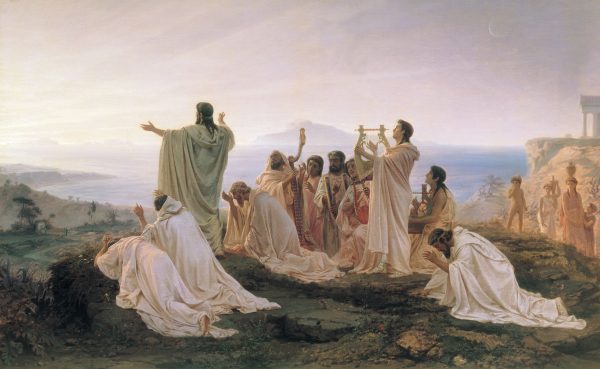Adam Smith v. Plato: on the Division of Labour and Market Forces
Article By Julian Scott
 In Book II of Plato’s Republic, Socrates imagines how a typical society might develop from simple beginnings into a more complex and organized entity. He speculates that, initially, everyone might do everything for themselves, such as building their own houses, making their own clothes and growing their own food.
In Book II of Plato’s Republic, Socrates imagines how a typical society might develop from simple beginnings into a more complex and organized entity. He speculates that, initially, everyone might do everything for themselves, such as building their own houses, making their own clothes and growing their own food.
But soon, he says, people would realize that it would be much more efficient if certain members of the group were to specialize in certain trades. In this way, housebuilders, tailors and farmers would arise as masters of specialized skills that could be exchanged with other members of the group for goods, services or money.
More than 2,000 years later the Scottish philosopher and economist Adam Smith came up with the same idea but took it much further, indeed, one could say, he took it to extremes. In his book ‘The Wealth of Nations’, Smith takes the example of the manufacture of pins to illustrate his ideas on the division of labour.
“A workman not educated to this business… nor acquainted with the use of the machinery employed in it could scarce, perhaps, with his utmost industry, make one pin in a day, and certainly could not make twenty…. But in the way in which this business is now carried on… one man draws out the wire, another straights it, a third cuts it, a fourth points it, a fifth grinds it at the top for receiving the head… and the important business of making a pin is, in this manner, divided into about eighteen distinct operations”.
Being an economist, Smith then goes into some very detailed calculations of how many pins can be made by ten men using only basic equipment: each of them will be able to make about 4,800 pins in a day. “But if they had all wrought separately and independently, and without any of them having been educated to this peculiar business, they certainly could not each of them have made twenty, perhaps not one pin in a day…”
Smith then proceeds to talk about the process of making nails and how the best solution is for individual workers to spend their whole lives making only nail heads, for example; again with many detailed calculations.
The overriding impression I received from reading all this was that Smith was quite obsessed with productivity and saw these unfortunate workers only in that light; he didn’t consider how this over-specialization might stunt their intellectual growth, lead to boredom and despair. He is thinking of the good of ‘society’ as a whole, or more specifically, in his own phrase, ‘the wealth of nations’ – but at what cost?
Plato, on the other hand, despite the criticisms made of his ideas by the likes of Karl Popper, was interested in the development of the individual. Because the basic premise of his work The Republic is that the purpose of politics is to lead citizens out of the ‘cave’ of ignorance, towards the ‘sunlight’ of truth and goodness. The division of labour is not only about producing wealth, which for Plato is not an ‘end in itself’, but exists for the purpose of developing a rational, ordered society in which the human being can flourish – as an individual and as part of a collective. In fact, he is as much against excessive wealth as he is against poverty, because both can lead to the degradation of human beings.
Another aspect of Adam Smith’s theories is Free Trade and the so-called ‘Invisible Hand’ of market forces. His belief, which still very much persists today at the heart of capitalistic thought, is that market forces (triggered by individuals pursuing their self-interest) will even everything out in the end, bringing greater economic growth and societal benefits. A current example is that of renters being forced out of London due to rocketing prices. In a way, this might be considered a good thing, because it will help achieve a more balanced spread of the population across the country, but at what human cost for those so displaced? And what about the loss of teachers, nurses and shop workers who can no longer afford to live in the capital?
Justice is one of the great losers in this game of market forces, because the market regulates itself through the amoral principle of supply and demand (but also through the immoral greed of those who exploit these factors). A recent example was the 3.3 billion profits of one of the UK gas companies, while many people freeze in their homes…
Once again, we find a very different approach in The Republic, where the most important criterion for society is, in Plato’s view, precisely Justice. When justice departs, he says, the society will inevitably fall apart.
Both Plato in Greece, and Confucius in China decided that the best way to improve politics for everyone was to train ‘philosopher-politicians’ for the future – for a time when humanity as a whole would come to realize the value of wisdom and benevolence in guiding societies, rather than self-interest. A medium to long term solution, perhaps, to an age-old problem.
Image Credits: By Futurilla | Flickr | CC0 1.0
The entity posting this article assumes the responsibility that images used in this article have the requisite permissionsImage References
By Futurilla | Flickr | CC0 1.0
Permissions required for the publishing of this article have been obtained



What do you think?